
Discovering your new home is off the gas grid doesn’t have to be a setback. Embrace the opportunity to explore innovative and sustainable heating solutions that can keep your living space cosy and warm.
For those that live in the UK, we are accustomed to experiencing cold weather for 2/3rds of the year. Whilst many contemporary homeowners in old houses or new builds have the luxury of having a central heating system that is linked up to the grid, what abouts those that live off grid? These are otherwise known as off grid homes, and can be more challenging to maintain heat for, especially when it comes to the colder months. In this article, we will look at the best ways to warm off grid homes without gas or electric, and explore the many alternatives that come with off grid heating.
Key Points:
- Understand the different types of off-grid heating systems, including solar thermal, biomass, heat pumps, and more.
- Evaluate the pros and cons of traditional heating methods like LPG, oil, wood, and coal.
- Learn about the cost implications and environmental impacts of each heating option.
- Discover installation tips and maintenance essentials for sustainable heating solutions.
- Learn about the benefits of underfloor heating systems to keep off grid homes warm for years to come.
- Find out how to optimise your home’s insulation to aid heating efficiency and comfort.
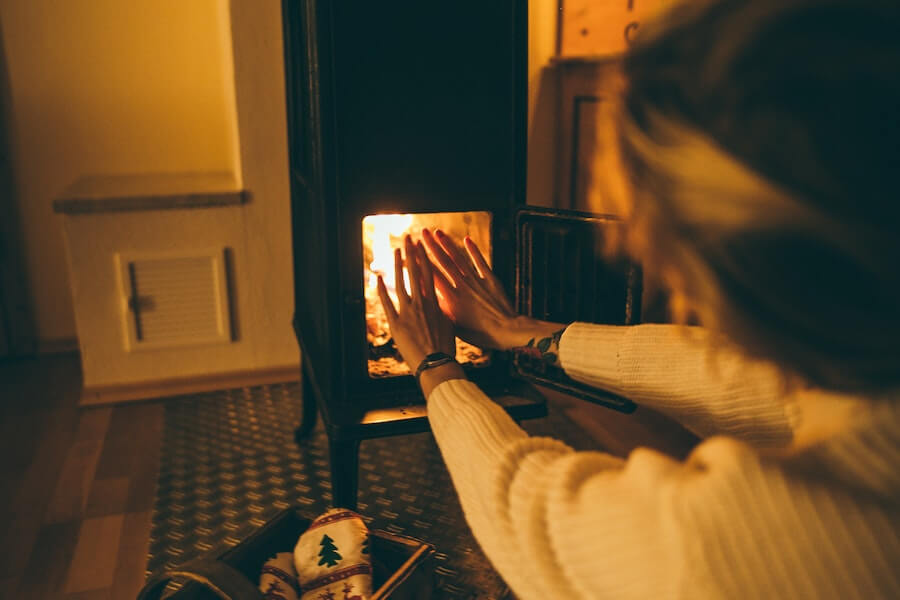
Can I Heat My Off Grid Home Without Gas or Electric?
Having a well-heated home off grid is essential, and yet about 15.1% of UK homes (as of 2021) do not have a link to a mains gas grid; this situation is exacerbated by those that actually live off the grid. It turns out that many homeowners are turning to off-grid heating solutions, either by choice or necessity, as they find their properties disconnected from conventional gas and electricity grids.
The idea of not relying on mainstream energy sources might seem daunting at first, but with the right information and planning, transitioning to off-grid heating can be a straightforward and beneficial move.
Renewable Off-Grid Heating Options
Recent revelations in modern technology have made renewable heating solutions increasingly viable and appealing. Here are some of the top options:
- Solar Thermal Systems
- Heat Pumps
- Biomass Boilers
Traditional and Electric Off-Grid Heating Methods
For those who prefer more conventional heating methods or have limitations due to location or budget, there are several options available:
- Liquid Petroleum Gas (LPG) and Oil
- Wood and Coal Burners
- Electric Boilers and Storage Heaters
7 Best Off Grid Heating Systems
Whilst living off-grid has many perks, such as avoiding overspending on gas and electricity, as well as other utilities, it is still worth considering investing in a long lasting heating system to aid your life off solitude off the grid. Here are some of the most popular and recommended heating systems that might be suitable for off grid heating in your home:
1. Underfloor Heating
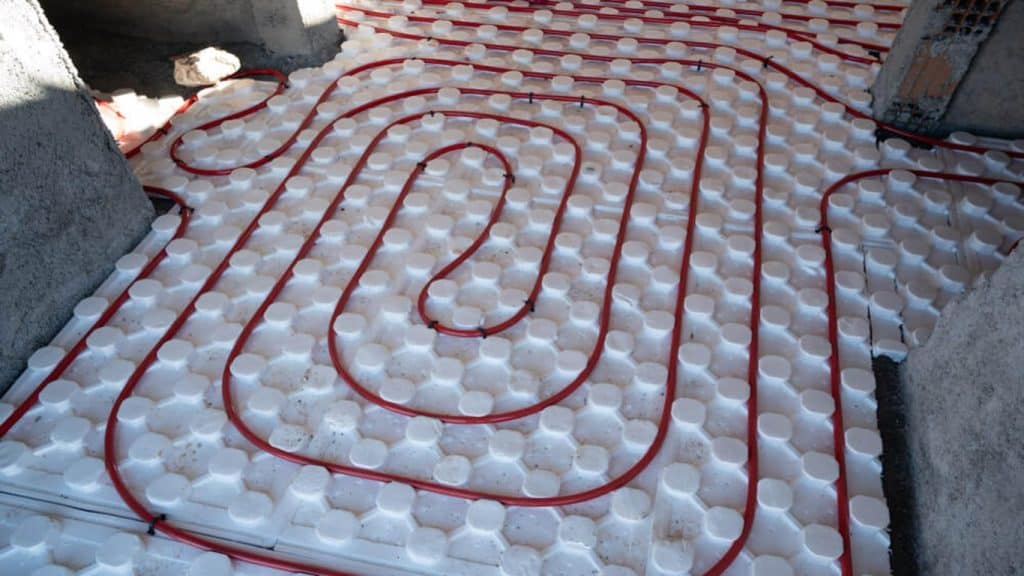
Underfloor heating is a great, practical way of saving on heat and can transition over from typical radiator systems.
You can get hot water underfloor heating and electric underfloor heating, but these depend on what suits you more, but both are exceptional towards heating your off-grid home more. Underfloor heating can be run off-grid, and can also be connected to solar power, for example, to make it more efficient for your heating at a cheaper price.
| Pros | Cons |
| Minimum effort is needed to keep the running | Variable installation costs |
| No maintenance required | |
| Take up less space compared to radiators | Time and effort (will only be a one-time issue) |
| Practical for all floor coverings | |
| Easy to install | Retrofitting: can affect floor heights |
Check out these articles to ways to combine underfloor heating with other heating systems:
- Ground source heat pumps with underfloor heating
- Solar underfloor heating
- Central heating system types
2. Biomass Boilers
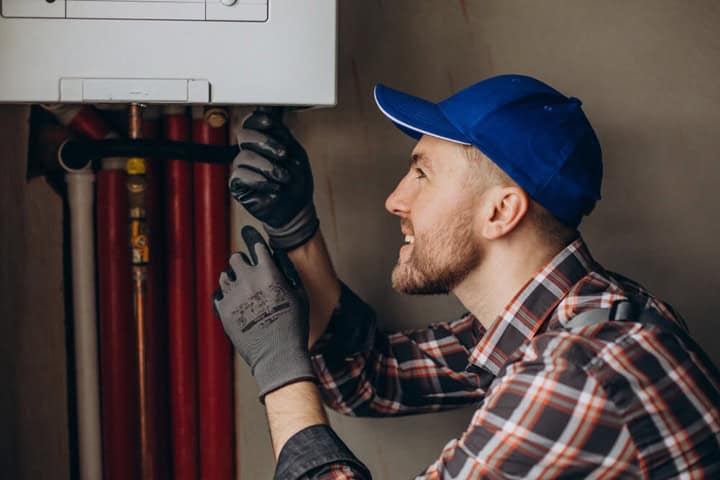
Biomass is an alternative form of renewable energy, created by burning organic matter like wood, household waste and plants. Using a biomass boiler is also an efficient way of burning less carbon dioxide, unlike fossil fuels.
Traditionally, wood pellets are used as a fuel source which helps provide hot water and heating.
| Pros | Cons |
| It uses more natural methods to produce heat, such as logs and wood pellets. | Steep upfront costs but it is only a one-time payment. |
| Cheaper to run. | They need more space than standard boilers. |
| Better for the environment. | |
| Biomass boilers operates at an efficiency of 89-91%, like that of normal boilers. | Need to keep fuel stored nearby. |
3. Heating Pumps
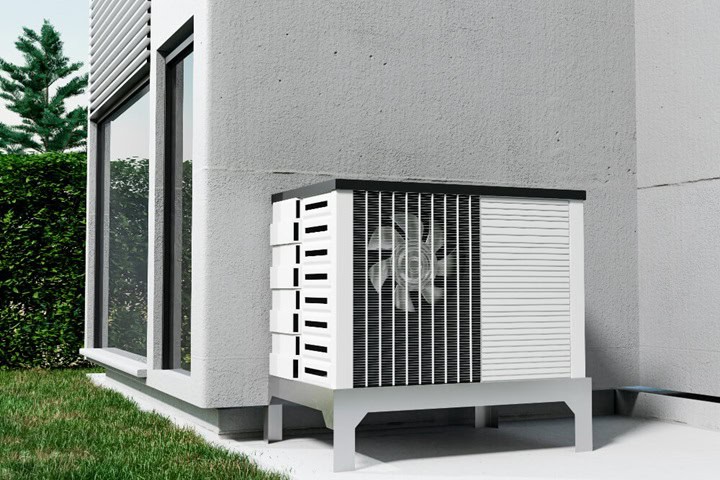
Although heating pumps do not produce heat, they help to redistribute heat from the ground or air, alongside a refrigerant that helps to circulate the heat within an indoor fan coil unit to compress the heat. This method is useful for off grid heating, in that when in cooling mode, the pump can absorb heat from inside your off-grid home and release it outside, should it get too warm inside.
There are two types of heating pumps you can usually find:
Air Source Heat Pumps (ASHP): This process converts and compresses refrigerated air into heat (as high as 80°C) and can operate to extract heat from temperatures like -20°C.
| Air Source Heat Pumps | |
| Pros | Cons |
| Cheap to run | There is more effort needed to install as it has indoor and outdoor components |
| Energy-efficient up to 300-500% | Need space on external walls for a fan unit to operate |
| Installation price ranges between £9,000 – £15,000 | |
Ground Source Heat Pumps (aka Geothermal heat pump): These harvests ground source energy from under the Earth and converts this energy into heating and hot water. Consistently energy efficient and can minimise costs and carbon if paired with solar PV or battery storage.
| Ground Source Heat Pumps | |
| Pros | Cons |
| These can last up to 20 years | Takes up more outdoor space |
| Operates quietly | Installation price ranges between £12,000 – £20,000 |
| Minimum maintenance | |
4. Solar Heating
Solar heating works by capturing and converting energy from the sun. You can retrofit solar panels onto your roof, and this process directs heat into individual rooms or preheats them using the air from the heat recovery ventilator.
Solar heating also works better for hot water rather than just heating but can help preheat other heating systems, and is therefore an adequate option for off grid heating in your home.
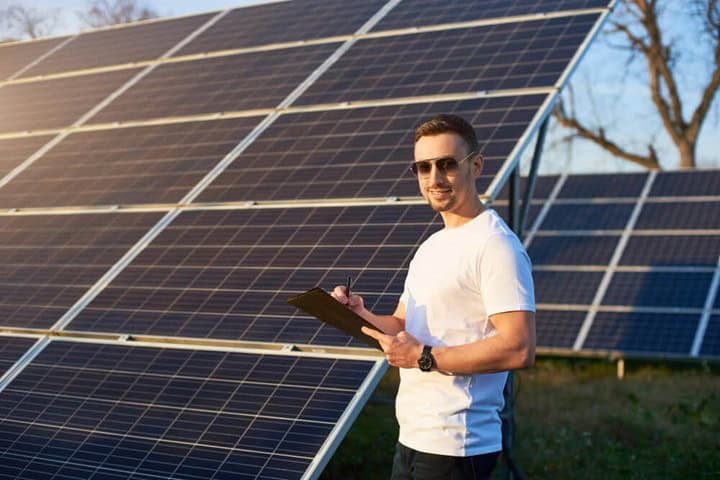
| Pros | Cons |
| This helps to reduce your carbon footprint. | It can give unbalanced levels of heating and hot water. |
| Cheaper than heat pumps to install; between £3,000 – £6,000 70-90% efficient. | Work better with traditional/biomass boilers, meaning you also need to take time to have these installed. |
5. LPG Heating Systems
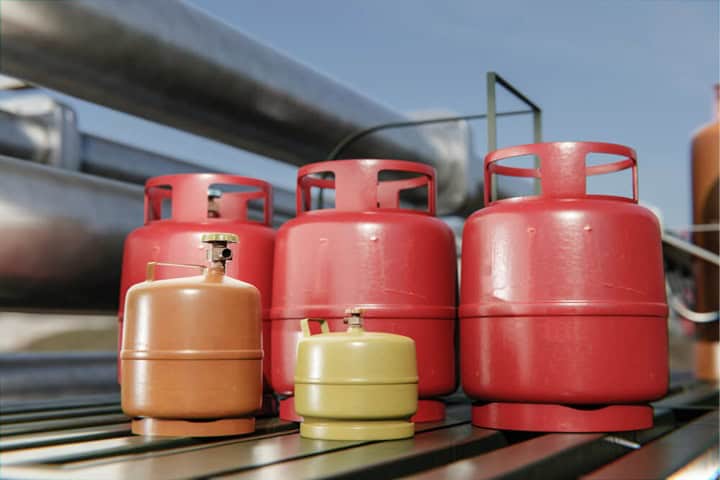
Liquid Petroleum Gas (LPG) is a popular choice for off-grid homes due to its versatility and efficiency. LPG can power heating systems as well as kitchen appliances, making it a comprehensive solution.
| Pros | Cons |
| Scalable heating system | More expensive to run than natural gas or oil |
| Cheaper than oil boilers | Requires regular top-ups and monitoring |
| Can be used for heating and cooking | Storage tank needs space and access |
| Some tanks can be buried underground | Produces poisonous gases |
Costs and Environmental Impact:
- LPG Boiler Cost: £400 – £2,500
- Installation Cost: £500 – £2,000
- Running Cost: 9.01p/kWh
LPG is less carbon-intensive compared to other fossil fuels like oil, but it still contributes to carbon emissions. Its delivery via lorries also adds to its environmental footprint.
6. Wood Heating Stoves and Log Burners
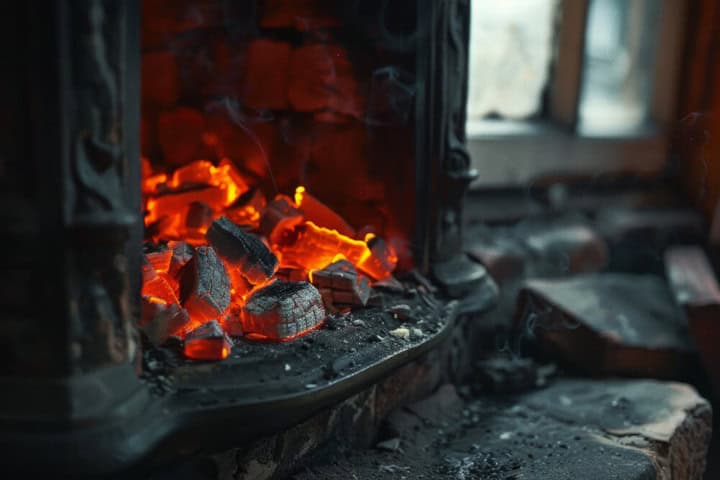
Wood stoves and log burners provide a rustic and renewable heating option, leveraging wood as a natural and potentially sustainable fuel source.
| Pros | Cons |
| Cost-effective fuel | Requires frequent maintenance |
| Renewable fuel source | High initial setup costs |
| Storage needs and impacts on local air quality |
Costs and Environmental Impact:
- Wood Stove Cost: £4,000 – £8,000
- Installation Cost: £500 – £1,500
Using wood for heating can be eco-friendly if sourced sustainably, but burning wood releases carbon and other pollutants that can affect air quality, especially if using damp or poor-quality logs.
7. Coal Heating
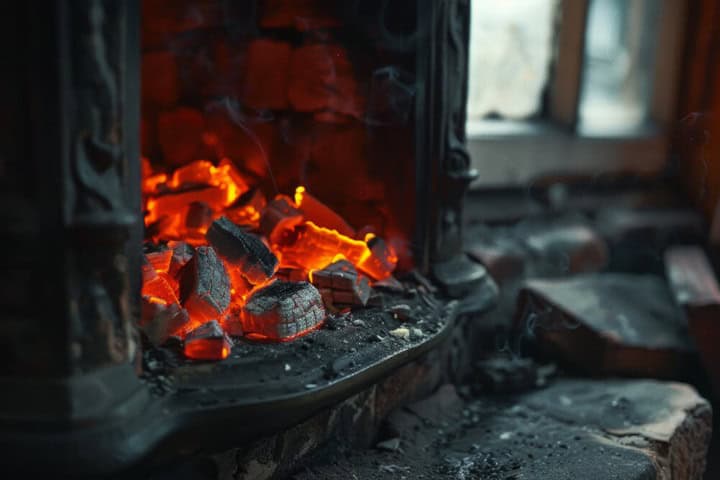
Coal is among the oldest heating fuels used, and many off grid homes may still have a coal burner integrated into the property. However, its environmental and health impacts have led to a decline in popularity, particularly in urban areas. Nevertheless, the pros and cons must still be considered:
| Pros | Cons |
| Easily available | Non-renewable and highly polluting |
| Simple to set up and operate | Requires space for storage |
| Emissions include harmful heavy metals |
Simple Fixes to Improve Warmth in Off Grid Heating
If you do not want to sink deep into your bank to pay for a long-lasting heating system for off-grid homes, you could apply simple fixes to improve warmth in your home, as follows:
- Cover up cracks/crevices in walls: By sealing up cracks and crevices with secure tape or sealant, you will easily save at least an extra 10% of heat in your off-grid home.
- Invest in double/triple glazing: This is when two or more layers of glass window panels are separated to reduce heat escaping a building structure. Installing double or triple glazing will significantly reduce the risk of losing heat in your home.
- Use thick curtains: Thick curtains will help reduce heat escaping through your windows.
- Let in sunlight throughout the day: This method is the least cost-effective, but it does not mean it will achieve great results, although it will help add an extra bit of heat to your off-grid home for the price of nothing.
- Maintain the efficiency of your chimney: As most houses will have had chimneys installed over a long period of time, sometimes the heat can also escape through the bricks. Therefore, it is worth getting your chimney checked, so make sure it is fully sealed, and you are not losing out on heating.
- Shut unused rooms: Doing this will help contain the heat inside the rooms and make your home less cold, even if windows in the unused rooms are open.
- Use extra layers: By wearing thick clothing like dressing gowns and pyjamas will easily help to keep you warm, and if you get too hot, then you can easily remove them.
Off Grid Heating For A Better Future
In conclusion, selecting the ideal off-grid heating solution hinges on numerous personal and property-specific factors, including environmental priorities, spatial constraints, and budget considerations. It’s crucial to optimise your home’s insulation first to ensure maximum efficiency from your chosen heating system. From renewable solar thermal systems and biomass boilers to traditional LPG and wood stoves, each option presents unique benefits. Carefully weigh these against their installation and operational demands to make a well-informed decision that aligns with your lifestyle and improve your home’s warmth and sustainability in 2025 and beyond.
Further reading:
Expand your knowledge further with these other articles that can assist with your off grid heating queries:
Still unsure of which system is best? Contact us today and see how we can help
FAQs
What temperature should I leave my off-grid home in the winter UK?
You can leave your temperature on a low setting when your house is empty at around 12 degrees. When there are occupants inside, your home should be set at an adequate temperature of 18-25 degrees.
What are the common types of heating systems for off-grid homes?
Wood stoves, propane heaters, and electric heating systems are commonly used for heating off-grid homes.
What fuel sources can be used for off-grid heating?
Off grid heating can be fueled using natural materials including wood and coal. Other sources include propane, natural gas, and even fossil fuels including heating oil and biodiesel.
What are the installation requirements for underfloor heating in an off-grid home?
Adding underfloor heating to your off grid home depends on the type of heating system that you wish to use. Traditionally, simple tubing layouts and wires will be needed for your underfloor heating, and have it connected to a local heating source.
Sources
Bolton, P., Stewart, I., (2024) Households off the gas-grid and prices for alternative fuels. UK Parliament: Houses of Commons Library. [online] Available at: https://commonslibrary.parliament.uk/research-briefings/cbp-9838/ [accessed 09/12/2024]
